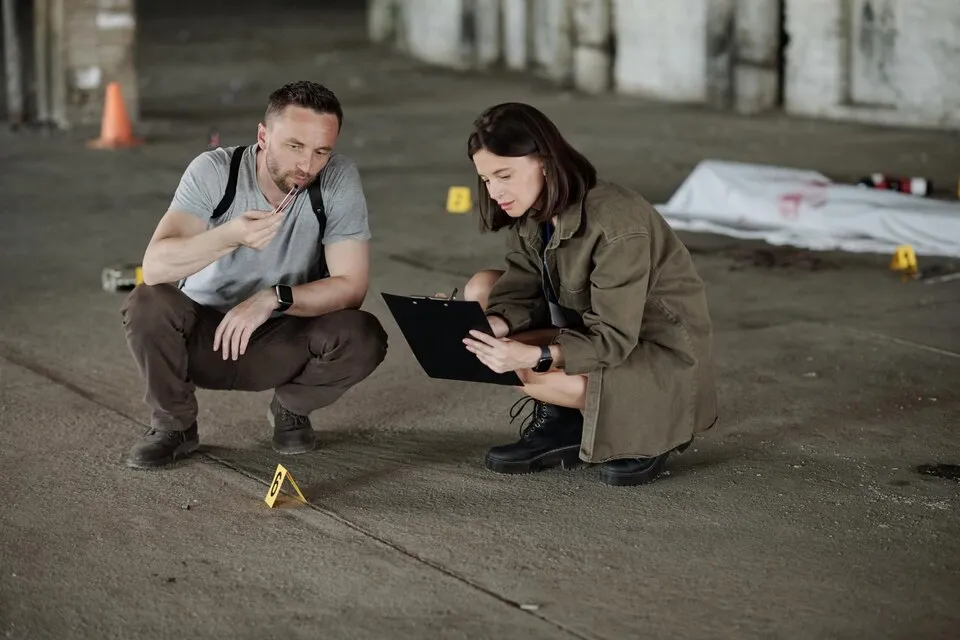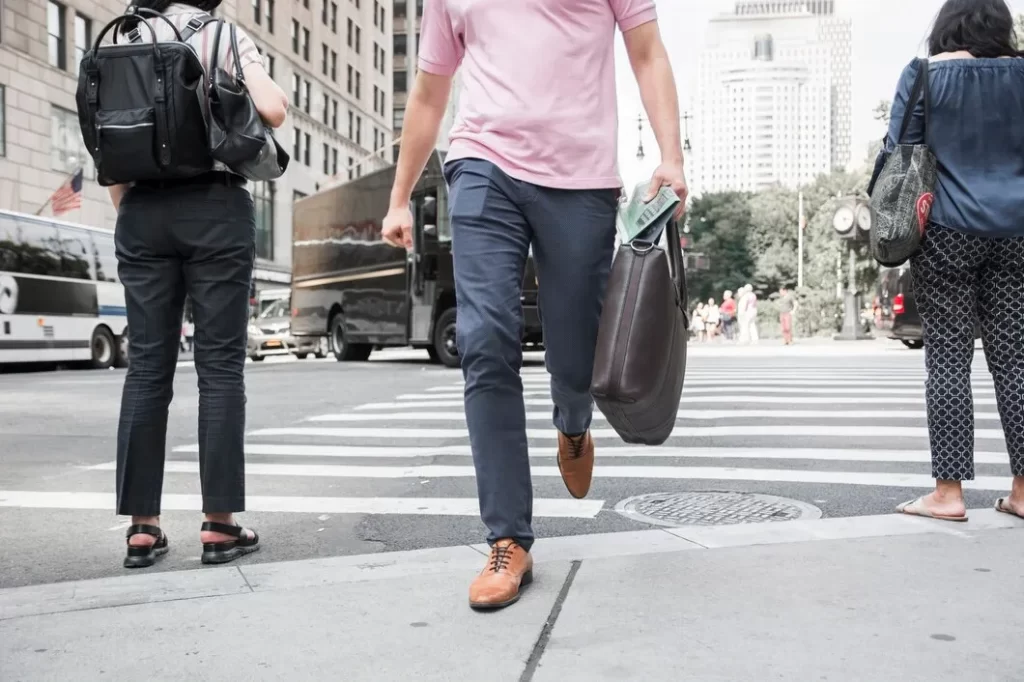Are you a pedestrian in Florida? If so, it’s important to understand your rights and responsibilities in case of an accident.
In this article, you’ll learn what you need to know about pedestrian accident liability in Florida, from who’s at fault to gathering evidence to insurance claims and more.
Keep reading to get informed and stay safe!
→ Take time to read our different articles that could interest you.
–https://1800askgary.com/spinal-cord-injury-treatment/
–https://1800askgary.com/swimming-pool-accident-injuries/
–https://1800askgary.com/traumatic-brain-injury-recovery/
–https://1800askgary.com/truck-accident-injuries-and-claims/
Visit our blog now!
Key Takeaways
- Pedestrians have the right of way when crossing a street, regardless of crosswalk presence.
- Pedestrians must obey traffic signals and signs.
- Pedestrians can be partially at fault if they don’t follow rules and precautions.
- Consult a personal injury lawyer to navigate the complexities of proving negligence and maximize your compensation.
The Rules of the Road
If you’re a pedestrian in Florida, it’s important to understand the rules of the road to know your rights and responsibilities and your pedestrian accident liability.
All pedestrians have the right of way when crossing a street, regardless of whether a crosswalk is marked or unmarked.
You should always cross at a crosswalk or intersection. If a traffic signal is present, you must obey the signal. When no signal is present, you must wait for an oncoming vehicle to pass and yield to drivers before crossing.
Pedestrians should always pay attention to their surroundings when approaching cars and cyclists.
Additionally, pedestrians must always walk facing traffic when no sidewalk is present.
Understanding the road rules is essential for pedestrians to stay safe and know their liability in the event of an accident.
Pedestrian Rights & Responsibilities
Pedestrians must understand their rights and responsibilities on the roads to remain safe and protect themselves in an accident.
In Florida, pedestrians must obey traffic signals and signs, including ‘Walk,’ ‘Don’t Walk,’ and ‘Wait’ signals. They must also know their surroundings and yield to vehicles when crossing at an intersection or mid-block. Pedestrians should never walk in the roadway if a sidewalk is available. If a sidewalk isn’t available, they should walk facing traffic and as far away from the roadway as possible.
Additionally, they must avoid distractions such as talking on a cell phone or listening to music with headphones. If they don’t take the necessary precautions, pedestrians may be partially at fault in an accident.
Understanding and following the rules can help pedestrians protect themselves and remain safe.
Who Is at Fault
Often, pedestrians are partially at fault for an accident if they don’t take the necessary precautions, such as obeying traffic signals, being aware of their surroundings, and avoiding distractions. Pedestrians must also bear in mind that drivers aren’t always completely at fault if an accident occurs, especially in cases where the pedestrian isn’t following the rules of the road.
In Florida, the comparative negligence rule is often applied when determining who’s at fault for a pedestrian accident. Suppose the court finds that both the pedestrian and the driver were partially at fault. In that case, the pedestrian’s compensation award will be reduced by a percentage equal to the fault attributed to them. For instance:
- If the court finds the pedestrian was 50% at fault, the compensation award will be reduced by 50%.
- If the court finds the pedestrian was 25% at fault, the award will be reduced by 25%.
- If the court finds the pedestrian was 0% at fault, the award won’t be reduced.
Reporting Accidents
If you’ve been involved in an accident as a pedestrian in Florida, you need to understand the reporting requirements, filing deadlines, and legal consequences of not reporting an accident.
To ensure you meet all the requirements, it’s important to know the details.
Know about Pedestrian Accident Liability: Report Requirements
You need to see the report requirements for pedestrian accidents in Florida. When an accident occurs, it’s important to:
- Report the incident to the police within 10 days
- Contact your insurance company immediately
- Keep track of all medical bills and documents related to the accident
Failure to report an accident or follow up with the necessary paperwork could result in fines, points against your license, or other legal penalties. Therefore, it’s important to act quickly and stay organized.
You should also be prepared to provide detailed information about the accident, such as the time, date, and location. These steps can help you comply with the law and protect yourself from any legal repercussions.
Filing Deadlines
Once you report the incident to the police, you must also contact your insurance company and keep track of all documents related to the accident within 10 days. Filing deadlines are important to consider regarding pedestrian accident liability in Florida. Generally, you have four years to file a personal injury lawsuit and two years to file a claim against property damage. It is important to take note of these deadlines and follow them accordingly.
| Emotional Response | Description |
| Fear | Missing the deadline can have serious consequences. |
| Urgency | Time is running out and you must act fast. |
| Relief | Knowing the deadlines can give you peace of mind. |
Legal Consequences to Consider for Pedestrian Accident Liability
Always report any accident you’re involved into the police, as legal consequences may result from not doing so. Failure to file a report could result in the following:
- Criminal charges or fines
- Civil lawsuits
- Difficulty in recouping damages
It is important to note that it’s a crime to leave the scene of an accident without providing your information to the other party. If you’re an accident victim, get the other party’s information and remain at the scene until the police arrive. Document the incident by photographing, recording the date and other details, and gathering witness statements.
Evidence Gathering
Gathering evidence after an accident is essential for proving your case. Take pictures of the accident scene and any visible injuries. Collect any witnesses’ names and contact info, and don’t forget to get a copy of the police report.
Also, be sure to document any medical visits and keep the receipts from any related expenses. You should also keep a journal to track your pain levels and any other symptoms associated with the accident.
If you can’t do any of these things yourself, have a friend or family member help you. The more evidence you can provide, the better your chances of a successful legal outcome.

Insurance Claims
Filing an insurance claim is critical to getting the compensation you deserve after an accident. Pedestrians in Florida should be aware of the following when filing an insurance claim:
- Gather all evidence of the accident, such as photos, witness statements, and medical records.
- File the police report and a claim with your insurance company immediately.
- Please include all relevant details, such as the accident’s date, time, and location.
It’s important to know Florida’s laws regarding at-fault claims and uninsured motorists. If an uninsured motorist injures you, you may be able to seek compensation from your own insurance company.
Legal Recourse
If you’ve been involved in an accident as a pedestrian in Florida, you should understand your legal options.
To prove fault and make a negligence claim, you must demonstrate that the other party involved in the accident was careless or reckless and that their negligence caused it.
You’ll need to collect evidence and build a strong case to do this.
Proving Fault
In an accident, you must prove that the other party was at fault to pursue legal recourse. To do this:
- Gather evidence, like photos, witness statements, and other essential information.
- File a police report as soon as possible to document the incident.
- Consult a personal injury lawyer to determine the strength of your case and the best way to proceed.
The burden of proof lies with the plaintiff, so take the necessary steps to ensure that you have sufficient evidence to back up your claim. Document all medical expenses, lost wages, and other costs associated with the incident. Your lawyer will be able to determine what other documents you may need to prove your case.
Negligence Claims
If you’re a pedestrian involved in an accident in Florida, you may have the legal right to pursue negligence claims against the at-fault party. Proving negligence is the key to compensation for damages, such as medical bills, lost wages, or pain and suffering.
It involves showing that the other party had a duty to use reasonable care, that they breached this duty, and that the breach was the direct cause of your injuries. You’ll need to gather evidence, such as accident reports, scene photographs, medical records, and witness statements, to prove negligence.
It’s also important to note that Florida has a comparative negligence law, which means that your settlement may be reduced if you’re found to be partially at fault for the accident.
Pursuing a negligence claim can be complex, so it’s best to consult with an experienced personal injury lawyer to ensure you receive the best possible outcome.
Contact 1-800-ASK-GARY to get the best support you deserve
1-800-ASK-GARY is a 24/7 complimentary helpline for individuals involved in motor vehicle accidents, including cars, commercial trucks, and motorcycles. Our team of specialists is available to assist those injured in such incidents at any time of day. Furthermore, we will directly connect you with a medical or legal expert who can support you in the aftermath of the accident.
→ Call us at (1-800-275-4279)
Our Services:
Frequently Asked Questions
What Is the Statute of Limitations for Filing a Personal Injury Claim in Florida?
In Florida, you have four years to file a personal injury claim. Time is of the essence, so don’t wait to get started.
Do I Need to Notify My Insurance Company if I Am in a Pedestrian Accident?
You should notify your insurance company if you are in a pedestrian accident. Understanding the potential liability and ensuring your rights are protected is important.
Are There Any Special Considerations for Pedestrians When Crossing the Street?
When crossing the street, be aware of your surroundings. Don’t rush, look both ways, and obey traffic signals. Obey the rules of the road, use crosswalks, and don’t assume drivers will stop for you.
Are Pedestrians Always Considered to Be at Fault in an Accident?
No, pedestrians are not always at fault in an accident. Liability can depend on the circumstances.
How Much Compensation Can I Expect to Receive From a Pedestrian Accident Claim?
The amount of compensation you can expect from a pedestrian accident claim depends on the severity of the accident and the associated damages.
Conclusion
Understanding your rights and responsibilities regarding pedestrian accident liability in Florida is key. Be sure to report any accidents, gather evidence, and contact your insurance provider if necessary.
You can always seek legal recourse if you feel the other party is at fault. Knowing how to handle these situations can help protect yourself and your rights.


